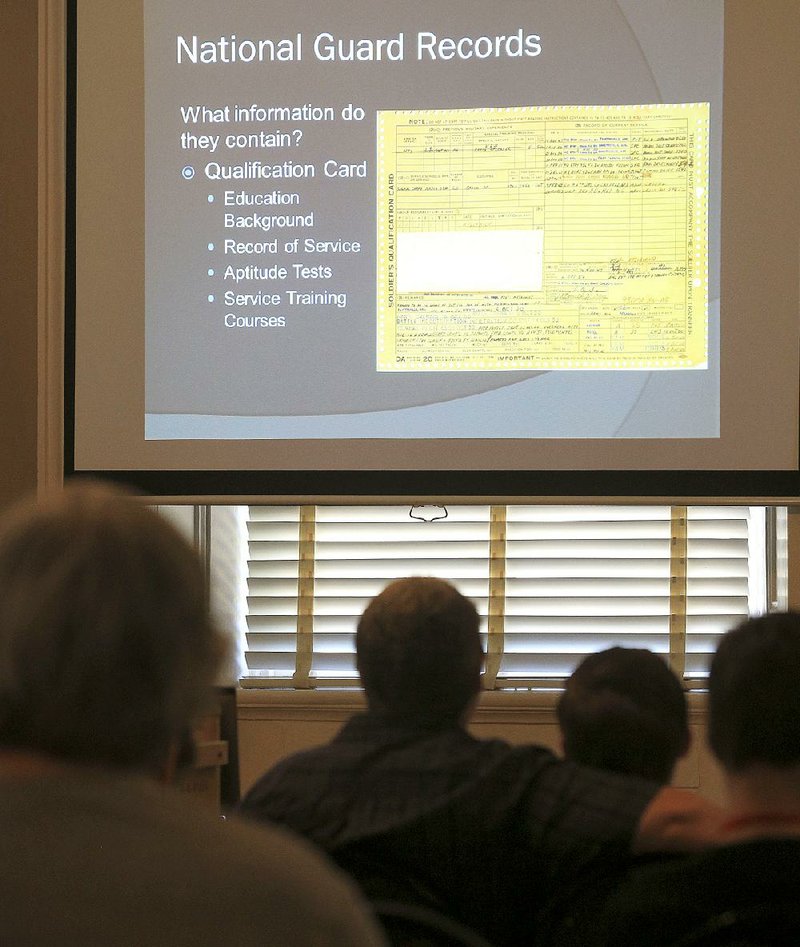On onionskin paper in airmailed letters, then 19-year-old Arkansan George Hemphill wrote to his parents from one Vietnamese town to the next.
"Hello mom and all," begins one of Hemphill's letters, dated Sept. 6, 1965. It was 4 p.m. and he was 10 miles south of Qui Nhon, a coastal city in central Vietnam.
"The reason I haven't wrote till now is we were in the valley chasing VC's [Viet Cong] again," the letter says.
Some information about the Marine's time serving in the Vietnam War can be gleaned from these letters and the photos he sometimes included. But for his daughter, April Goff, it wasn't enough.
"We knew they went to Vietnam, but what did they do?" said Goff, an administrative specialist with the Arkansas History Commission.
Goff co-presented a Saturday morning genealogy workshop "Researching Modern Military Records" at the MacArthur Museum of Arkansas Military History with the commission's archival manager, Mary Dunn.
Hemphill was one of 23 in the audience, and he took photos of his daughter with his phone during her presentation.
Goff told the workshop attendees she used information from her father's letters, such as the name of his battalion and company, to trace his service in the Vietnam War. From there, she read the book Utter's Battalion, which details the gritty tour of 2nd Battalion, 7th Marine Regiment, known as Echo Company 2/7.
Alternate records, outside of federal records found in the National Archives, provided Goff with a more detailed explanation of why her father was in Vietnam and what he did while he was there, she said.
Members of Echo Company 2/7 battled malaria, monsoons and violent ambushes in the hills and mountains of Vietnam, said Goff, adding that online maps and her father's photos have given her a better idea of the terrain there.
Hemphill had chronicled his Vietnam War experiences in a photo album called "E 2/7 1964-1966 Nam Pictures of Places & Friends," which he shared in the company's electronic newsletter, Echo Company Two-Seven Tooter.
Photos show military members playing volleyball with Vietnamese children. They also show a woman singing with a band on stage and Marines drinking beer in Okinawa.
"E. Co's transport, the U.S.S. Pickaway, stopped at Pearl Harbor, where we tried to drank all the beer there," Hemphill wrote in the newsletter. "No one remembers if we did it or not."
Besides military unit newsletters, Goff recommended that people who want to learn about their family members' military service search through declassified records, as well as branch and battle reports.
Some of those records can be found through the the Arkansas History Commission's online catalog. The National Archives also has online research tools for federal records.
Like Goff, Dunn has researched family members' military records.
Her grandfather's National Guard medical reports proved that they had more in common than she thought.
"His eyesight was just like everybody's in my family -- horrible," said Dunn, pushing her glasses up the bridge of her nose.
The Arkansas History Commission receives numerous records requests every week, Dunn said, and the number rises in December because people are researching family members during the holiday season.
More effort has been put into preserving military records in recent years, Goff said.
"Hey, that's Daddy's stuff, but it's historical records, too," she said.
Metro on 08/02/2015
